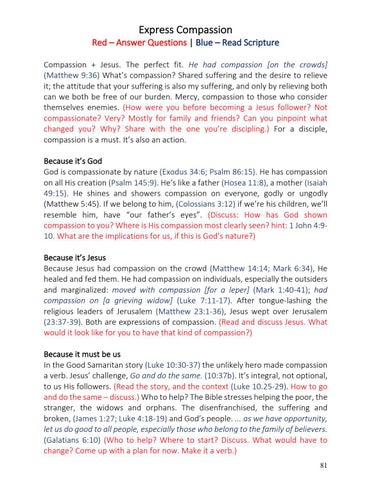Express Compassion Red – Answer Questions | Blue – Read Scripture Compassion + Jesus. The perfect fit. He had compassion [on the crowds] (Matthew 9:36) What’s compassion? Shared suffering and the desire to relieve it; the attitude that your suffering is also my suffering, and only by relieving both can we both be free of our burden. Mercy, compassion to those who consider themselves enemies. (How were you before becoming a Jesus follower? Not compassionate? Very? Mostly for family and friends? Can you pinpoint what changed you? Why? Share with the one you’re discipling.) For a disciple, compassion is a must. It’s also an action. Because it’s God God is compassionate by nature (Exodus 34:6; Psalm 86:15). He has compassion on all His creation (Psalm 145:9). He’s like a father (Hosea 11:8), a mother (Isaiah 49:15). He shines and showers compassion on everyone, godly or ungodly (Matthew 5:45). If we belong to him, (Colossians 3:12) if we’re his children, we’ll resemble him, have “our father’s eyes”. (Discuss: How has God shown compassion to you? Where is His compassion most clearly seen? hint: 1 John 4:910. What are the implications for us, if this is God’s nature?) Because it’s Jesus Because Jesus had compassion on the crowd (Matthew 14:14; Mark 6:34), He healed and fed them. He had compassion on individuals, especially the outsiders and marginalized: moved with compassion [for a leper] (Mark 1:40-41); had compassion on [a grieving widow] (Luke 7:11-17). After tongue-lashing the religious leaders of Jerusalem (Matthew 23:1-36), Jesus wept over Jerusalem (23:37-39). Both are expressions of compassion. (Read and discuss Jesus. What would it look like for you to have that kind of compassion?) Because it must be us In the Good Samaritan story (Luke 10:30-37) the unlikely hero made compassion a verb. Jesus’ challenge, Go and do the same. (10:37b). It’s integral, not optional, to us His followers. (Read the story, and the context (Luke 10.25-29). How to go and do the same – discuss.) Who to help? The Bible stresses helping the poor, the stranger, the widows and orphans. The disenfranchised, the suffering and broken, (James 1:27; Luke 4:18-19) and God’s people. ... as we have opportunity, let us do good to all people, especially those who belong to the family of believers. (Galatians 6:10) (Who to help? Where to start? Discuss. What would have to change? Come up with a plan for now. Make it a verb.) 81
Stages Discipleship for Disciples

Turn static files into dynamic content formats.
Create a flipbookArticles inside
Issuu converts static files into: digital portfolios, online yearbooks, online catalogs, digital photo albums and more. Sign up and create your flipbook.


